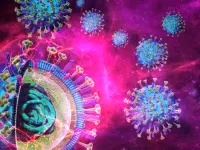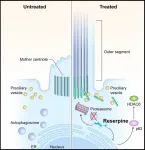(Press-News.org) Life may come in all shapes and sizes, but in nature the most extreme size ranges predominate, according to Rutgers researchers.
A survey of body sizes of Earth organisms, published Wednesday, March 29, in the science journal PLoS ONE, shows that the planet’s biomass – the material that makes up all living organisms – is concentrated in organisms at either end of the size spectrum.
“This conclusion – that life on earth comes packaged predominantly in the largest and smallest sizes – was a discovery that surprised us,” said Malin Pinsky, an associate professor in the Department of Ecology, Evolution and Natural Resources in the Rutgers School of Environmental and Biological Sciences (SEBS) and an author of the study. “Sometimes it seems like mosquitoes or flies or ants must run the world, and yet, when we did the numbers, we found that our world is dominated by the microbes and the trees. These are the silent partners that recycle the nutrients and replenish the air all around us.”
To obtain the results, researchers spent five years compiling and analyzing data about the size and biomass of every type of living organism on the planet – from tiny one-celled organisms such as soil archaea and bacteria to large organisms such as blue whales and sequoia trees. They found that the pattern favoring large and small organisms held across all types of species and was more pronounced in land-based organisms than in marine environments.
“The largest body sizes appear across multiple species groups, and their maximum body sizes are all within a relatively narrow range,” said Eden Tekwa, lead author of the study who conducted the research first as a postdoctoral fellow at Rutgers, then at the University of British Columbia.
“Trees, grasses, underground fungi, mangroves, corals, fish and marine mammals all have similar maximum body sizes,” added Tekwa, now a research associate with McGill University’s Department of Biology. “This might suggest that there is a universal upper size limit due to ecological, evolutionary or biophysical limitations.”
Katrina Catalano, another author of the study, conducted research as a doctoral student in the Department of Ecology, Evolution and Natural Resources at Rutgers.
The researchers said humans belong to the size range that comprises the highest biomass, which is a relatively large body size. The work opens the door to a better understanding of elemental life processes.
“Body size is a fundamental feature of life, governing everything from metabolic rates to birth rates and generation times,” Pinsky said. “Cataloging which body sizes are most common is a key step towards understanding the world around us.”
END
Nature favors all creatures great and small over medium size
Rutgers researchers conduct survey on the body sizes of Earth’s organisms
2023-03-29
ELSE PRESS RELEASES FROM THIS DATE:
Sox9 protein enables molecular time travel that can lead to colorectal cancer
2023-03-29
Study Title: Aberrant cell state plasticity mediated by developmental reprogramming precedes colorectal cancer initiation
Publication: Science Advances: March 29, 2023, 2:00pm ET 10.1126/sciadv.adf0927
Dana-Farber Cancer Institute author: Pratyusha Bala, PhD, Jonathan P. Rennhack, PhD, Daulet Aitymbayev, MS, Matthew B. Yurgelun, MD, William C. Hahn, MD, PhD, Nilay S. Sethi, MD, PhD
Summary:
Normally the lining of the colon forms a series of steep hills and valleys. At the surface, where the hills peak, are functional colon cells that do the organ’s work of absorption and secretion. Deep in the valleys are stem cells that constantly ...
Ancient African empires’ impact on migration revealed by genetics
2023-03-29
Traces of ancient empires that stretched across Africa remain in the DNA of people living on the continent, reveals a new genetics study led by UCL researchers.
Published in Science Advances, the collaboration between UCL geneticists working alongside anthropologists, archaeologists, historians and linguists in Africa and beyond found evidence for when different peoples intermixed across the continent. Their findings indicate migration linked to vast empires such as the Kanem-Bornu and the kingdoms of Aksum and Makuria, ...
Method for improving seasonal flu vaccines also aids pandemic prediction
2023-03-29
(MEMPHIS, Tenn. – March 29, 2023) Improving the seasonal influenza vaccine and public health specialists’ ability to predict pandemic potential in new flu strains may be possible due to new findings from scientists at St. Jude Children’s Research Hospital. The key is the stability of a viral protein that gains entry into human cells. The findings were published today in Science Advances.
“We found that the protein flu viruses use to enter cells, hemagglutinin, needs to be relatively stable and resistant to acid in an effective H3N2 flu vaccine,” said senior and co-corresponding ...
Model for predicting transmission of COVID-19 can help policymakers monitor virus, inform health surveillance systems
2023-03-29
The COVID-19 pandemic presents unprecedented challenges to public health worldwide. Tracking the dynamics of the coronavirus permits governments, organizations, and individuals to make projections in an effort to curb the spread of the pandemic. But while a large amount of data about COVID is collected and publicly available, the information can be unreliable and subject to bias. In a new study, researchers analyzed data from Cali, Colombia, to develop a model that provides a template for tracking data, predicting transmission, and informing health surveillance systems.
The study was conducted by researchers at Carnegie Mellon ...
FDA-approved drug shows promise in lab models for blinding childhood disease
2023-03-29
A National Eye Institute-led team has identified a compound already approved by the U.S. Food and Drug Administration that keeps light-sensitive photoreceptors alive in three models of Leber congenital amaurosis type 10 (LCA 10), an inherited retinal ciliopathy disease that often results in severe visual impairment or blindness in early childhood.
LCA 10 is caused by mutations of the cilia-centrosomal gene (CEP290). Such mutations account for 20% to 25% of all LCA – more than any other gene.
Using a mouse model of LCA10 and two types of lab-created tissues from stem ...
OHIO diabetes researchers discover the potential of CIDEC protein to mitigate obesity-related cardiometabolic disease
2023-03-29
A team of researchers from Ohio University’s Heritage College of Osteopathic Medicine recently discovered a novel role of human-CIDEC gene in improving metabolic dysfunction and cardiovascular health. The study, “Endothelial-Specific Expression of CIDEC Improves High-Fat Diet–Induced Vascular and Metabolic Dysfunction,” published in Diabetes focuses on vascular function and its association with metabolic diseases like insulin resistance, Type 2 diabetes, and cardiovascular disease.
“This is a very impactful study, and we have moved in the right direction to find a way to reduce cardiovascular ...
The COVID-19 pandemic has increased – but also polarised – trust in science
2023-03-29
Research by the Milner Centre for Evolution at the University of Bath, UK, along with colleagues at Universities of Oxford and Aberdeen, finds that trust in scientists has hugely increased overall since the COVID-19 pandemic, but that attitudes have also become more polarized. The study also found that people were more likely to take the COVID-19 vaccine if their trust in the science had increased.
Whether it be climate change, vaccines or GM foods, trust in science and scientists has rarely been more important. ...
DoD funds new project aimed at protecting global supply chains, infrastructure
2023-03-29
Thanks to the work of Arizona Sen. Mark Kelly, a new project led by Northern Arizona University, with various collaborators throughout the nation, will help the United States better protect the critical supply chain infrastructure and the supply chains that keeps the country and its economy running.
Benjamin Ruddell, professor in the School of Informatics, Computing, and Cyber Systems and founder of the FEWSION project, is the NAU lead. Funded at $8 million for year one, the project aims to work with technology known as Fused Global Data Analytics and Visualization. The team’s leadership, ...
CNIO researchers help to understand the functioning of the protein that makes DNA loops in the human genome
2023-03-29
Cohesin is a ring-shaped protein that surrounds and moves around the DNA molecule, forming the loops. It is a crucial process for the cell.
Understanding how cohesin works has been one of the challenges of molecular biology in recent decades.
The work now published by Ana Losada's group at CNIO will serve to deepen our understanding of the disease known as Cornelia de Lange syndrome.
At the end of the 1990s, Ana Losada, a researcher at the Spanish National Cancer Research Centre (CNIO), then at the Cold Spring Harbor Laboratory (New York, USA), discovered a protein in frogs of the Xenopus genus that is fundamental to ...
AI could set a new bar for designing hurricane-resistant buildings
2023-03-29
Being able to withstand hurricane-force winds is the key to a long life for many buildings on the Eastern Seaboard and Gulf Coast of the U.S. Determining the right level of winds to design for is tricky business, but support from artificial intelligence may offer a simple solution.
Equipped with 100 years of hurricane data and modern AI techniques, researchers at the National Institute of Standards and Technology (NIST) have devised a new method of digitally simulating hurricanes. The results of a study published today in Artificial Intelligence for the Earth Systems demonstrate that the simulations can accurately ...
LAST 30 PRESS RELEASES:
ASU researchers to lead AAAS panel on water insecurity in the United States
ASU professor Anne Stone to present at AAAS Conference in Phoenix on ancient origins of modern disease
Proposals for exploring viruses and skin as the next experimental quantum frontiers share US$30,000 science award
ASU researchers showcase scalable tech solutions for older adults living alone with cognitive decline at AAAS 2026
Scientists identify smooth regional trends in fruit fly survival strategies
Antipathy toward snakes? Your parents likely talked you into that at an early age
Sylvester Cancer Tip Sheet for Feb. 2026
Online exposure to medical misinformation concentrated among older adults
Telehealth improves access to genetic services for adult survivors of childhood cancers
Outdated mortality benchmarks risk missing early signs of famine and delay recognizing mass starvation
Newly discovered bacterium converts carbon dioxide into chemicals using electricity
Flipping and reversing mini-proteins could improve disease treatment
Scientists reveal major hidden source of atmospheric nitrogen pollution in fragile lake basin
Biochar emerges as a powerful tool for soil carbon neutrality and climate mitigation
Tiny cell messengers show big promise for safer protein and gene delivery
AMS releases statement regarding the decision to rescind EPA’s 2009 Endangerment Finding
Parents’ alcohol and drug use influences their children’s consumption, research shows
Modular assembly of chiral nitrogen-bridged rings achieved by palladium-catalyzed diastereoselective and enantioselective cascade cyclization reactions
Promoting civic engagement
AMS Science Preview: Hurricane slowdown, school snow days
Deforestation in the Amazon raises the surface temperature by 3 °C during the dry season
Model more accurately maps the impact of frost on corn crops
How did humans develop sharp vision? Lab-grown retinas show likely answer
Sour grapes? Taste, experience of sour foods depends on individual consumer
At AAAS, professor Krystal Tsosie argues the future of science must be Indigenous-led
From the lab to the living room: Decoding Parkinson’s patients movements in the real world
Research advances in porous materials, as highlighted in the 2025 Nobel Prize in Chemistry
Sally C. Morton, executive vice president of ASU Knowledge Enterprise, presents a bold and practical framework for moving research from discovery to real-world impact
Biochemical parameters in patients with diabetic nephropathy versus individuals with diabetes alone, non-diabetic nephropathy, and healthy controls
Muscular strength and mortality in women ages 63 to 99
[Press-News.org] Nature favors all creatures great and small over medium sizeRutgers researchers conduct survey on the body sizes of Earth’s organisms


